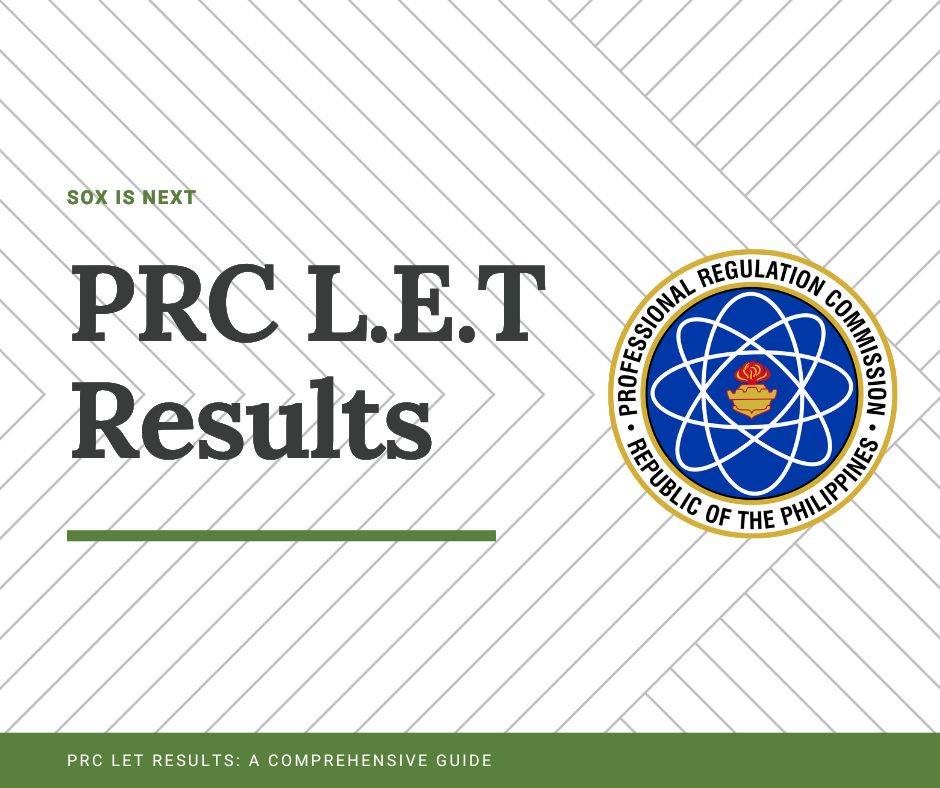PRC LET Results: A Comprehensive Guide
The Licensure Examination for Teachers (LET) is a pivotal step for aspiring educators in the Philippines, dictating their entry into the professional teaching sphere. Administered by the Professional Regulation Commission (PRC), the LET results not only validate the readiness of future teachers but also serve as a benchmark for educational standards across the country.
Overview of the LET Examination
The PRC LET aims to assess the competency of prospective teachers in both general and professional education. It covers a broad spectrum, from English and Filipino to specialized subjects such as Mathematics, Science, and Social Studies. The exam is conducted biannually across various locations, catering to thousands of hopefuls eager to earn their teaching credentials.
Recent LET Results
Each session of the LET yields a fresh batch of licensed educators ready to shape the minds of the youth. Recent results have showcased a varied passing rate, highlighting the exam’s challenging nature and the examinees’ determination. Top scorers and schools often receive special recognition, underlining excellence in teacher preparation.
Historical Performance Analysis
An examination of past LET results reveals fluctuating passing rates, shedding light on trends and shifts within the education sector. These insights can help identify areas for improvement in teacher education and exam preparation strategies.
Impact of PRC LET Results
The implications of PRC LET results extend beyond individual achievements. They play a crucial role in the hiring process within schools and significantly influence the quality of education delivered to students. Achieving a high pass rate is seen as a testament to the effectiveness of teacher education programs.
Preparing for the PRC LET
Success in the LET requires careful preparation, encompassing a thorough review of both general and professional education topics. Aspiring teachers often turn to review centers, online resources, and study groups to enhance their readiness for the exam.
What Happens After Passing the PRC LET
Passing the LET is a monumental achievement, marking the beginning of a professional teaching career. Newly licensed teachers must then undergo the process of obtaining their professional license, after which a myriad of opportunities opens up, from public to private sector education roles.
How to Check LET Results and Verify Ratings
The PRC provides an online platform for examinees to access their LET results and verify individual ratings. This system ensures transparency and ease for candidates eager to learn their standings.
The LET results are more than just numbers; they symbolize the culmination of hard work, dedication, and a shared dream of educating future generations. As the education landscape evolves, so too does the importance of the LET in fostering a competent and passionate teaching workforce. Congratulations to all newly licensed teachers, and best wishes to future examinees on their journey to professional teaching.
For those aspiring to take the LET or awaiting results, staying informed through official PRC channels and preparing diligently remains the key to success.
FAQs about PRC LET Results
Q1: What is the PRC LET?
– The Professional Regulation Commission (PRC) Licensure Examination for Teachers (LET) is a national exam in the Philippines that assesses the qualifications of aspiring teachers in elementary, secondary, and special education sectors.
Q2: How often is the PRC LET conducted?
– The LET is conducted twice a year, typically in March and September. Dates may vary, so it’s recommended to check the official PRC website for specific schedules.
Q3: When are the PRC LET results usually released?
– The LET results are generally released within 40-50 working days after the examination. However, the release period can vary. For updates, candidates should monitor the official PRC website or trusted educational news outlets.
Q4: How can I check my LET results?
– LET results can be checked on the official PRC website. Look for the ‘Licensure Examination Results’ section and find the specific release for the LET. You’ll need your application number or full name to search for your results.
Q5: What happens if I pass the LET?
– Passing the PRC LET qualifies you to register as a Licensed Professional Teacher (LPT). You’ll need to complete the registration process with the PRC, which includes signing in the Roster of Registered Professionals and obtaining your professional ID and certificate of registration.
Q6: Can I retake the LET if I fail?
– Yes, there is no limit to the number of times you can retake the LET. However, it’s important to prepare thoroughly before attempting the exam again.
Q7: What are the main subject areas covered in the LET?
– The LET covers General Education (GenEd), Professional Education (ProfEd), and a specialization area for secondary education candidates. GenEd includes English, Filipino, Mathematics, Science, and Social Sciences, while ProfEd covers teaching principles, strategies, and more.
Q8: How is the LET scored?
– The LET is scored based on standardized testing procedures. Your total score is a combination of your performances in the General Education, Professional Education, and your chosen specialization. Passing the LET requires meeting or exceeding the set passing score.
Q9: What should I do if there’s an error in my PRC LET result?
– If you notice any discrepancies or errors in your LET result, you should contact the PRC directly. Provide them with your exam details and the specific issue for assistance.
Q10: Are LET results subject to review or appeal?
– Once released, LET results are considered final. The PRC does not typically offer a review or appeal process for examination scores. However, you can request a rechecking of your answer sheets if you believe there has been an error.
For the most accurate and up-to-date information, always refer to the official PRC website and official announcements regarding the LET.
Table of Contents
#PRC_LET_Results #LET_Passers #LET_Topnotchers #Teacher_Licensure_Exam #Philippine_Education #LET_Exam_Tips #PRC_Announcements #LET_Review_Guides #LET_Performance #Professional_Teaching_Standards












